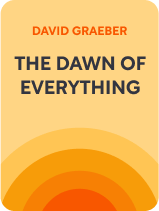

This article is an excerpt from the Shortform book guide to "The Dawn of Everything" by David Graeber. Shortform has the world's best summaries and analyses of books you should be reading.
Like this article? Sign up for a free trial here.
Are indigenous peoples just societies that haven’t evolved yet? Is it accurate to think of them as savage or primitive?
In The Dawn of Everything, anthropologist David Graeber and archaeologist David Wengrow assert that our beliefs about the evolution of human societies have been wrong all along. They challenge the conventional anthropological narrative and attempt to set the record straight on indigenous societies.
Keep reading for an enlightening discussion about where indigenous stereotypes come from and how they miss the mark.
Debunking Indigenous Stereotypes
European colonists’ descriptions of indigenous societies made their way into academia, and the study of such cultures became known as anthropology. Early anthropologists used these descriptions (and sometimes their own fieldwork) to create theories about how human societies evolved. The conventional anthropological narrative has led to a simplistic idea about indigenous societies, and many of those indigenous stereotypes persist even today.
Graeber and Wengrow explain that, since Enlightenment thinkers were particularly fascinated with the indigenous people who had egalitarian ideologies, those descriptions received the most attention in Europe. Over time, Europeans came to view all indigenous peoples as living in societies where everyone was equal and there was no formal leadership. Likewise, when they looked at their own societies and others like them, which were arranged in monarchies, they believed that all modern societies were hierarchical. This was a gross oversimplification. This flawed, established narrative led scholars to ask: How did humans go from living in egalitarian societies that value personal liberty to hierarchical societies that value control over citizens?
The Evolution of Human Societies
Prompted by the above question, anthropological scholars theorized that human societies evolve over time from simple egalitarian bands and tribes to complex stratified states. According to Graeber and Wengrow, scholarly discussions of equality and inequality tend to assume that inequality is a result of the rise of agriculture. One of the major points the authors argue in this book is that this conventional narrative is wrong.
| From “Savage” to “Civilized” This conventional narrative was drawn from the works of early anthropologists and social theorists who were quite ethnocentric—meaning, they saw their own cultures as superior and evaluated all other cultures against this standard. In his 1884 book The Origin of the Family, Private Property, and the State, Friedrich Engels argued that humans had evolved for some time in a state of equality, but with the invention of farming came inequality in all its forms, including gender inequality. However, Engels was drawing his conclusions based on only a small sample of descriptions of non-state societies, on the assumption that they were all generally similar. Some of the work Engels drew upon was that of early anthropologists, sometimes called social evolutionists or social Darwinists because they took Darwin’s ideas about biological evolution and applied them to human societies. One of these social Darwinists was Lewis Henry Morgan, who wrote the book Ancient Society in 1877. In this book, Morgan described human societies in terms of three levels of social development: savagery, barbarism, and civilization. Morgan defined these levels based on the tools and weaponry the societies had developed, as well as their social organization and structure. So, bands and smaller tribes might have been classified as savages, while larger tribes and chiefdoms might have fallen into the barbarism category. Only state societies could be classified as civilized. And in fact, Morgan subdivided this category into upper and lower civilizations— with the upper civilization category being reserved for the colonizing countries like Britain, France, and America. Morgan was American and studied the Iroquois tribe firsthand, so he was basing his categorization system on his fieldwork among the Iroquois, combined with descriptions written by other anthropologists of cultures around the world. Since the Wendat were Iroquoian people, and Morgan’s work was taking place in the mid- to latter-19th century, it’s possible his work was influenced by the indigenous critique of the 18th century. |
According to Graeber and Wengrow, anthropologists traditionally describe the evolution of human societies as follows: bands, tribes, chiefdoms, and then states. According to Graeber and Wengrow, early anthropologists explicitly defined these stages in terms of “progress.” Societies at the state level were considered to be civilized while simpler societies were categorized as primitive or savages. The authors clarify that contemporary anthropology patently rejects such value judgments and would no longer classify any human society as savage. But, they point out, it’s still commonly accepted that the forms of society that existed before agricultural states were all somewhat similar—small, simple, and relatively egalitarian.
As a result of this view of simple indigenous societies, Graeber and Wengrow argue that, in the modern imagination there are two general views of what a pre-state kind of lifestyle was like—it was either an idyllic life of harmony with nature or a miserable existence of constant suffering. These two disparate views, they argue, can be traced back to philosophers Jean-Jacques Rousseau, who described the admirable life of the “noble savage,” and Thomas Hobbes, who described pre-modern life as “solitary, poor, nasty, brutish, and short.”
| The State of Nature The debate between the views of Jean-Jacques Rousseau and Thomas Hobbes is often referred to as a debate about the state of nature, meaning it revolves around the question of whether human nature is inherently good or evil. Rousseau’s view was that human nature is peaceful and compassionate and that it’s only corrupted when humans move away from their nature and live in an unnatural way—-meaning, in a hierarchical state-level society. Hobbes, on the other hand, believed human nature was selfish and greedy and tended toward violence. He argued that these natural tendencies must be controlled by man-made institutions, like government and organized religion, that essentially force people to behave. We can see this dichotomy of thought in many aspects of society today, from political ideologies to education. For example, in the US, the public education system is a highly structured, hierarchical environment with a standardized curriculum and a high value placed on technology. By contrast, Waldorf and Montessori schools place emphasis on allowing children to explore in less structured environments, encourage creativity, and eschew technology. This system values an idyllic concept of pre-modern life and emphasizes sustainable skills like handcrafts and gardening. |

———End of Preview———
Like what you just read? Read the rest of the world's best book summary and analysis of David Graeber's "The Dawn of Everything" at Shortform.
Here's what you'll find in our full The Dawn of Everything summary:
- How our beliefs about the evolution of human societies have been wrong all along
- An exploration of different notions of freedom and equality
- Thought-provoking questions about the inevitability of inequality






